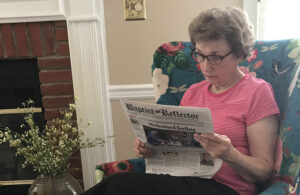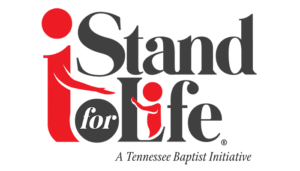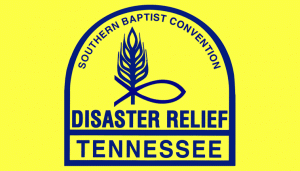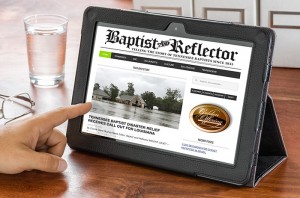Since 1835, the B&R has kept Tennessee Baptists informed, inspired
By Art Toalston
Contributing Writer, B&R

Jolene Dawson, a resident of Columbia, has been reading the Baptist and Reflector since the 1970s, when her husband, Mike Dawson, served as pastor at Dalewood Baptist Church, Nashville. Mike Dawson is now pastor emeritus at First Baptist, Columbia, where he served as senior pastor from 1996-2005.
FRANKLIN — After a tornado tore through their community — and her family’s home — followed by the upheaval of COVID-19, Ashley Lee had no less resolve for Vacation Bible School.
“So many of our children had already had so much taken away from them,” Lee told the Baptist and Reflector. “We knew we couldn’t let VBS be one more ‘No’ in our kids’ lives.”
More than 100 COVID-19 related news and feature stories have been reported by the B&R since April, such as the VBS that Lee and others led for dozens of families at Friendship Community Church in Mt. Juliet.
Those articles, and others relaying insight to Tennessee Baptists on global missions, the sanctity of life, race relations, local church ministry, Baptist beliefs and Christian living, reflect the function of the Baptist and Reflector throughout its 185-year history, beginning just two years after the Tennessee Baptist Convention’s formation in 1833.
“Christian journalism in Southern Baptist life has a long and illustrious history,” the late Fletcher Allen, B&R editor from 1987-1998, wrote in his first editorial. “We must not allow that history to be blemished; the task is the same task that faced those first journalists: Tell the news openly, honestly, completely, with integrity and compassion.”
R.G.B. Howell, the Nashville pastor who founded The Baptist in 1835, the key forerunner of the Baptist and Reflector, noted in his context: “The Religious Press is a noble engine for the dissemination of truth, and the establishment of proper morals. Perhaps no other mode is so effective.
The living voice may arouse generous emotions, may produce high and holy determination, but it soon passes away…. Not so, however, with the printed page; it lives and talks to present and future generations.”
COVERING COVID-19
 The coronavirus pandemic certainly is among the foremost junctures in the B&R’s 185-year history of joining Tennessee Baptists’ hearts and minds in advancing the Gospel across the state — including reports about VBS, the most effective outreach by Southern Baptists spanning generations.
The coronavirus pandemic certainly is among the foremost junctures in the B&R’s 185-year history of joining Tennessee Baptists’ hearts and minds in advancing the Gospel across the state — including reports about VBS, the most effective outreach by Southern Baptists spanning generations.
“We looked at how we could best reach out and share Jesus,” said Brock Wherry, families director at Union Avenue Baptist Church in Memphis. “We decided to do a ‘tool box’ for each child to have at home.” The church placed family friendly VBS activities in boxes and distributed them “to anyone, anywhere,” Wherry said, shipping more than 200 across Memphis and elsewhere in Tennessee and in seven other states as far away as Massachusetts and Washington.
The B&R’s extensive COVID-19 coverage, beyond VBS, has included an array of articles conveying insight into ministry amid COVID-19’s impact: technology aids for online worship and church meetings, safety precautions for returning to on-site worship and encouragement and help for pastors laden with stress and fatigue.
“Focus on compassion ministries in your community that result in evangelism and disciple making,” Randy C. Davis, president and executive director of the Tennessee Baptist Mission Board, wrote in his regular B&R column. “A rapidly growing number of people are hurting spiritually, mentally and financially. They need help.” Support for missions is in Tennessee Baptists’ DNA, he wrote, but “a healthy Acts 1:8 missiological strategy begins with the local church’s mission field.”
Consider a season of “discovery and recovery,” TBC president Bruce Chesser, pastor of First Baptist Church in Hendersonville, wrote in a B&R column. Make a list of those who were involved in the church but haven’t yet returned, he suggested, then reach out “for the purpose of ministering to them, encouraging them and eventually recovering them to the active ranks of your church fellowship. During these months our focus is on people, people, people.”
RACE RELATIONS REPORTING
 Whether history will compare 2020 to other eras of great challenge such as the Civil War, World Wars I and II, the Spanish flu of 1918-1920 and the Great Depression, the Baptist and Reflector has been attentive to the tumultuous issue of racial justice sparked by the killing of George Floyd by a Minneapolis police officer as well as frontline pro-life legislation at the Tennessee statehouse.
Whether history will compare 2020 to other eras of great challenge such as the Civil War, World Wars I and II, the Spanish flu of 1918-1920 and the Great Depression, the Baptist and Reflector has been attentive to the tumultuous issue of racial justice sparked by the killing of George Floyd by a Minneapolis police officer as well as frontline pro-life legislation at the Tennessee statehouse.
“We are encouraged by white friends who watched the brutality of George Floyd’s death and have refused to stay silent,” black church catalysts Ternae Jordan, Charles Grant and Thomas Bester of the Tennessee Baptist Mission Board wrote in a joint B&R column.
“Many have said for the first time that they ‘get it;’ that in some remote way they better understand our struggle,” Jordan, Grant and Bester wrote “to take the initiative to seek out an African American and simply ask to hear their story. Our journey is considerably different from yours. Ask God to give you the humility that leads to understanding.” Then, they wrote, “Be a voice for change and an agent for action. Be the change you want to see in the world. … God reaps a mighty harvest through the seeds of repentance.… We cannot waste this moment.”
The B&R reported that leaders of the Hamilton County and Bledsoe Baptist associations had joined in statements with African American and other faith leaders in the wake of George Floyd’s killing.
Calling for “equal justice for all Americans, regardless of skin color,” the Hamilton County statement noted, “During this solemn time, we are calling our community to examine our hearts for any wayward thoughts or motives that would prevent such racial justice from being realized and then to seek God’s leading in what role He desires us to play in such reconciliation.”
The Bledsoe Association in a joint statement with the East Fork District Baptist Association (a National Baptist association) and the Gallatin United Ministerial Alliance called for “sincere and intentional conversations concerning racism. Out of these conversations, we pray that greater relationship and deeper friendships are established to collectively confront the sin of racism.”
In October 2017, Davis of the TBMB was joined in a news conference with an ethnically diverse group of Tennessee Baptists to denounce plans for white supremacist rallies in Shelbyville and Murfreesboro several weeks after violent confrontations in Charlottesville, Va.
Davis declared that “it is impossible to stand silently by while the white supremacy movement plans to invade our state and perpetrate its evil.”
Tennessee Baptists are “categorically opposed to the white supremacy movement and any movement that diminishes the dignity of any human,” he said.
“This bigotry has no place in our American society and it certainly has no place in the life of anyone who is a follower of Jesus,” he added.
No violence erupted during the Shelbyville rally, which drew about 200 participants versus more than 800 counter-demonstrators; organizers subsequently cancelled the Murfreesboro rally.
SANCTITY OF LIFE
 Reporting from a pro-life perspective has been a continuing facet of the Baptist and Reflector’s work since the 1973 Roe v. Wade decision by the Supreme Court to legalize abortion.
Reporting from a pro-life perspective has been a continuing facet of the Baptist and Reflector’s work since the 1973 Roe v. Wade decision by the Supreme Court to legalize abortion.
In 2019 and 2020, the B&R kept Tennessee Baptists informed about momentum to finally enact legislation to protect unborn children, fueled in part by the convention’s “I Stand for Life” petition drive that garnered thousands of signatures.
A B&R headline in June marked a key moment in the effort: “Tennessee lawmakers pass pro-life bill in session’s final hours.” Davis, in a B&R column titled “I Stand for Life, now more than ever,” expressed appreciation for the bill’s passage but wrote that he was “grieved at the missed opportunity for our lawmakers to define life beginning at conception.”
Though the law is destined for a court challenge, Davis reminded B&R readers of the overarching pro-life cause. “Continue sharing the gospel. … Job No. 1 for every believer is to share the life-transforming message of Jesus Christ,” he wrote. If the courts strike down the legislation, “let’s regroup and stand again” for legislation that defines life as beginning with conception.
“Advocate for life at every turn,” he continued. “The unborn, the impoverished, the refugee, the disenfranchised, the elderly, the disabled.” Support crisis pregnancy centers, he urged, noting, “Untold numbers of babies are saved every year because of the good and compassionate work of these ministries.” And consider and support adoption and foster care. “Christ followers always have been the first to step up and take care of the orphaned,” he wrote.
DISASTER RELIEF
 In disaster relief, the wildfires in Gatlinburg in November 2017 prompted nearly two dozen breaking news and follow-up stories in the Baptist and Reflector keeping Tennessee Baptists informed of the need for volunteers and financial gifts during the immediate relief effort and long-term recovery.
In disaster relief, the wildfires in Gatlinburg in November 2017 prompted nearly two dozen breaking news and follow-up stories in the Baptist and Reflector keeping Tennessee Baptists informed of the need for volunteers and financial gifts during the immediate relief effort and long-term recovery.
The day after the Nov. 28 wildfires, the B&R reported that Roaring Fork Baptist Church had lost its sanctuary and family life center, First Baptist Church had lost its youth building and Banner Baptist Church had lost its fellowship hall among the 2,000 homes and buildings destroyed or damaged in the fires that claimed 14 lives and left 160 others injured, with 14,000 people evacuated.
More than 750 disaster relief volunteers served in the three months after the fires, setting up within 24 hours to provide meals for evacuees, first responders and others. More than 1,250 other volunteers followed within a year not just from Tennessee but five other states.
They helped Roaring Fork and Banner Baptist churches rebuild and aided families in more than 425 debris clean-up and other projects.
“They need someone to show up.” Davis said of disaster survivors in his B&R column. “That’s what our Tennessee Baptist Disaster Relief volunteers do. … They show up and lighten the unbearable load of loss. They serve. They pray. They hug. They cry with people. They share the gospel of Jesus Christ and lead people to the feet of the One who can help them with their greater disaster, which is separation from God the Father.”
ON MISSION

TIME TESTED
In publication since 1835, the Baptist and Reflector ranks among the nation’s longest continuous running newspapers. For comparison purposes, here’s a look at when some other newspapers, both secular and denominational, began publication.
Hartford Courant – 1764
Biblical Recorder – 1835
Alabama Baptist – 1843
New York Times – 1851
LA Times – 1881
Atlanta Journal – 1883
Washington Post – 1877
Wall Street Journal – 1889
The Tennessean – 1907
Baptist Messenger – 1912
National Enquirer – 1926
USA Today – 1982
Missions, evangelism, church planting and revitalization news of the Tennessee Baptist Convention has been the cornerstone of the Baptist and Reflector through the years.
Among the B&R’s most memorable reports was the return of missionary doctor Bill Wallace’s remains to Knoxville in 1985. Wallace served in China from 1935 until his death in 1951 from torture during two months of imprisonment. Then editor Al Shackleford wrote a front page story and editorial about the memorial service at Wallace Memorial Baptist Church.
Shackleford also published the letter Wallace had written to his home church, Broadway Baptist in Knoxville, as he left to serve at a Baptist hospital in Wuzhou in southern China. “God called me to be one of His servants as a physician on July 22, 1926, over nine years ago,” Wallace wrote, in the 100th year of Southern Baptist work in China, so that “through the long years of preparation there would be no doubt that I was doing God’s will.”
“You can get SBC news from other sources, but we are the best source of Tennessee Baptist news. May that always be true,” B&R editor Lonnie Wilkey wrote when the paper reached its 175th anniversary in 2010. Underscoring his resolve when elected to the position in 1998, his commitment is unchanged “to build on the paper’s storied tradition” to keep the B&R “unashamedly Tennessee Baptist.”
The front page of the Baptist and Reflector was a key channel for announcing a 24-hour prayer hotline staffed by Tennessee Baptist disaster relief chaplains at 1-844-600-8262 (844-600-TBMB).
“In this new environment we know there are people that are struggling with discouragement, fear and loneliness,” Davis said of the hotline’s launch in April. “It is our desire to provide the lifeline of a prayer partner. For any citizen of our state, and even beyond the borders of Tennessee, you’ve got someone willing to pray for you and with you 24/7.”
KEY CHALLENGES
 Publishing the Baptist and Reflector, however, has never been easy amid ever increasing costs especially for delivery through the mail, even dating back to the 1800s and 1900s. A tipping point came in 2014 when the paper moved from a weekly to biweekly schedule following such costcutting steps as reducing the staff to four full-time employees in 1988 from six full-time and two part-time staff.
Publishing the Baptist and Reflector, however, has never been easy amid ever increasing costs especially for delivery through the mail, even dating back to the 1800s and 1900s. A tipping point came in 2014 when the paper moved from a weekly to biweekly schedule following such costcutting steps as reducing the staff to four full-time employees in 1988 from six full-time and two part-time staff.
In the biweekly schedule, Wilkey aimed “to make available more B&R content, not less” by increasing its editions to 12-16 pages from the previous 8-12 and by an expanded use of on-the-go social media by TBC staff and a redesigned baptistandreflector.org website. Lamenting the change from his 25 years in editing print publications, Wilkey wrote, “But times change and technology provides new ways to communicate. If we don’t adapt now we’ll go the way of the dinosaur.”
“In the long run I think Tennessee Baptists will have broader access,” Davis wrote in his B&R column, describing the paper as “the strongest point of TBC communication, a lifeline for Tennessee Baptists.”
TBMB communications director Chris Turner, in a B&R column the following year, wrote that “the best days of the Baptist and Reflector lie ahead if we cooperate with our readers, focus on how God is at work in Tennessee and through Tennessee Baptists, and offer biblical insight into today’s issues that help shape our readers’ Christian worldview.
“We live at a pivotal point in history and these serious times cry out for a serious publication that offers a serious biblical perspective,” Turner stated. “The Baptist and Reflector is that publication, and by God’s grace, will be even more so in the future.”
As the COVID-19 crisis was raging this year, Turner used his B&R column to set forth the preeminent challenge of the times: “For the believer, the instability and chaos are clear calls to salvation. Seek the Lord while He may be found, for today is the day of salvation. For the believer, these days should serve as a reminder to … focus ahead and keep moving forward. … We’ve built fragile lives on the instability of the American dream only to discover, once again, shifting sand is subject to something as innocuous as the rapidly mutating whims of microscopic organisms. There is a better life to be had than being a hostage to the tyranny of the temporal.”
Wilkey wrote in his column, “We know God is in control. We have to live like it and show His love at a time the world needs Him most. We may be confined to our spaces, but we have technology that allows us to interact and communicate with others. “Share the hope of Christ,” he exhorted, “on your Facebook pages and in your media posts.”
Davis challenged Tennessee Baptists in his column, “Will our children remember this as a time when we labored in prayer before the Lord, proclaimed His gospel and longed for a Great Spiritual Awakening unlike we’ve seen in hundreds of years?”
In straightforward fashion, Davis wrote, “The stakes are high. It isn’t easy, but this could be our generation’s finest hour.”
